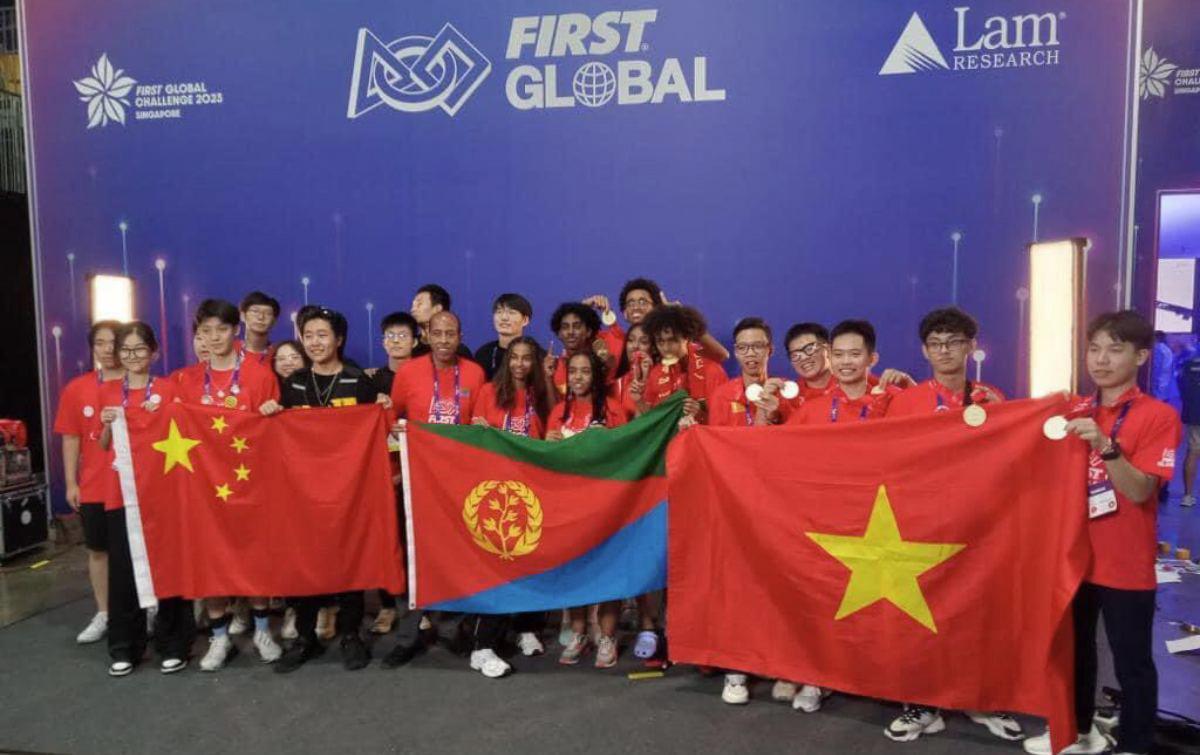Africa-Press – Eritrea. Young Eritreans in the Diaspora interact intensely with their homeland and represent their country in different global forums and competitions. Recently, five high school students from Calgary, Canada, who represented Eritrea at the 2023 FIRST Global Challenge robotics competition held in Singapore from October 7-10, competed with their peers from across the globe in the field of robotics and won gold medal to become the pride of their country.
The five young students, between 14 and 18, organized themselves as a team to represent Eritrea and achieved a remarkable victory. Eritreans at home and abroad have expressed their delight through social media and see the victory as a significant achievement for the country. They reacted with great pride to the creativity and problem-solving skills of the five young Eritreans.
The Singapore annual robotics event brings together thousands of students from all over the world and provides a platform to collaboratively compete in a thrilling game. During the event, the young students compete, collaborate, and exchange ideas. The Eritrean team, made up of Adonai Habte, Heyab Samson, Niyat Dimtzu, Rafael Abraha, and Yosan Woldeghebriel, displayed outstanding talent and innovation at the competition. The team raised the Eritrean flag high among the victorious nations.
The victory of the young Eritreans in Diaspora at the international robotics competition reveals the potential of young Eritreans in science and technology. The talent of Eritrean Diaspora could help address the country’s pressing issues in its development efforts. It could also serve as an impetus to young Eritreans at home and abroad to become innovative and creative. The five high school Eritrean students, who have been able to test their talents at the global competition, were hosted by various media outlets.
Young Eritreans in the Diaspora are actively involved in the social, economic, political, and diplomatic life of their homeland. They show their Eritrean identity in their use of Eritrean languages, knowledge of Eritrea’s history, their homecoming, family ties and closeness to Eritrea. What is remarkable is that they feel at home in both their homeland and their host country. Trans-nationalism is a prominent feature of the Eritrean Diaspora.
Having strong family ties is one of the main drivers of strong relationships of the Diaspora with their homeland. The Eritrean Diaspora are known for their frequent visits of their homeland and empathy toward their compatriots.
Adonai Habte, member of the team, said, “It [the victory] definitely means a lot to our families and the community; it’s an honor to represent Eritrea.” Although migration entails problems related to identity and belongingness, Eritreans in Diaspora have time and again demonstrated their sense of belonging and self-confidence.
The young that were born abroad know their national culture and history very well. Eritrea’s Diaspora invest heavily on educating the young generation about the history and culture of their country. They organize events that allow their children to be active citizens. The five young students’ decision to represent Eritrea at a global competition demonstrates their affiliation with the homeland.
Many suggest that there should be a platform to boost cooperation between the youth inside Eritrea and those in Diaspora to be able to share innovative ideas and best practices. There is no doubt that by enhancing the already existing link, the potential of innovation in all fields could be increased, which in turn could contribute toward social and economic development by stimulating the transfer of knowledge and the exchange of best practices.
The Eritrean Diaspora maintain connections and conduct various forms of transactions to influence national events in a positive way. Besides their economic assistance, they are active in transferring technology. Many believe that technological assistance of the Eritrean Diaspora are an under-utilized development resource that have the potential to produce desirable socioeconomic outcomes. The transfer can happen when Eritreans in Diaspora return to live in or visit Eritrea and when Eritreans visit their relatives abroad. Many Eritreans in Diaspora possess vital skills that are needed in the ongoing development efforts. Today, the transfer of skills, technology and ideas are viewed as important benefits one can expect from the Diaspora. The knowledge, skills and technology that the Eritrean Diaspora bring back home are as important as or even more important than their financial assistance.
Eritreans living abroad are an important extension of the homeland, and they contribute, out of their volition, both in human and material resources for the development of the country. In the past, the primary focus might have been on financial support to their families. This may need to be complemented by paying equal attention to the transfer of knowledge and technology in order to reverse brain drain into brain gain, benefitting Eritrea from its highly skilled Diaspora.
For More News And Analysis About Eritrea Follow Africa-Press







